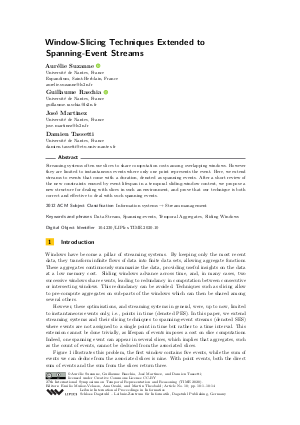Window-Slicing Techniques Extended to Spanning-Event Streams
Authors
Aurélie Suzanne  ,
Guillaume Raschia
,
Guillaume Raschia  ,
José Martinez,
Damien Tassetti
,
José Martinez,
Damien Tassetti
-
Part of:
Volume:
27th International Symposium on Temporal Representation and Reasoning (TIME 2020)
Part of: Series: Leibniz International Proceedings in Informatics (LIPIcs)
Part of: Conference: International Symposium on Temporal Representation and Reasoning (TIME) - License:
 Creative Commons Attribution 3.0 Unported license
Creative Commons Attribution 3.0 Unported license
- Publication Date: 2020-09-15
File

PDF
LIPIcs.TIME.2020.10.pdf
- Filesize: 0.72 MB
- 14 pages
Document Identifiers
Subject Classification
ACM Subject Classification
- Information systems → Stream management
Keywords
- Data Stream
- Spanning-events
- Temporal Aggregates
- Sliding Windows
Metrics
- Access Statistics
-
Total Accesses (updated on a weekly basis)
0Document
0Metadata
Abstract
Streaming systems often use slices to share computation costs among overlapping windows. However they are limited to instantaneous events where only one point represents the event. Here, we extend streams to events that come with a duration, denoted as spanning events. After a short review of the new constraints ensued by event lifespan in a temporal sliding-window context, we propose a new structure for dealing with slices in such an environment, and prove that our technique is both correct and effective to deal with such spanning events.
Cite As Get BibTex
Aurélie Suzanne, Guillaume Raschia, José Martinez, and Damien Tassetti. Window-Slicing Techniques Extended to Spanning-Event Streams. In 27th International Symposium on Temporal Representation and Reasoning (TIME 2020). Leibniz International Proceedings in Informatics (LIPIcs), Volume 178, pp. 10:1-10:14, Schloss Dagstuhl – Leibniz-Zentrum für Informatik (2020)
https://doi.org/10.4230/LIPIcs.TIME.2020.10
BibTex
@InProceedings{suzanne_et_al:LIPIcs.TIME.2020.10,
author = {Suzanne, Aur\'{e}lie and Raschia, Guillaume and Martinez, Jos\'{e} and Tassetti, Damien},
title = {{Window-Slicing Techniques Extended to Spanning-Event Streams}},
booktitle = {27th International Symposium on Temporal Representation and Reasoning (TIME 2020)},
pages = {10:1--10:14},
series = {Leibniz International Proceedings in Informatics (LIPIcs)},
ISBN = {978-3-95977-167-2},
ISSN = {1868-8969},
year = {2020},
volume = {178},
editor = {Mu\~{n}oz-Velasco, Emilio and Ozaki, Ana and Theobald, Martin},
publisher = {Schloss Dagstuhl -- Leibniz-Zentrum f{\"u}r Informatik},
address = {Dagstuhl, Germany},
URL = {https://drops.dagstuhl.de/entities/document/10.4230/LIPIcs.TIME.2020.10},
URN = {urn:nbn:de:0030-drops-129783},
doi = {10.4230/LIPIcs.TIME.2020.10},
annote = {Keywords: Data Stream, Spanning-events, Temporal Aggregates, Sliding Windows}
}
Author Details
References
-
James F. Allen. Maintaining knowledge about temporal intervals. Communications of ACM, 26(11):832-843, 1983.

-
Arvind Arasu, Shivnath Babu, and Jennifer Widom. The CQL continuous query language: semantic foundations and query execution. The VLDB Journal, 15(2):121-142, 2006.

-
Arvind Arasu and Jennifer Widom. Resource Sharing in Continuous Sliding-Window Aggregates. VLDB '04, 30:336-347, 2004.

-
Michael H. Böhlen, Anton Dignös, Johann Gamper, and Christian S. Jensen. Temporal Data Management : An Overview. In eBISS 2017, volume 324, pages 51-83, 2017.

-
Paris Carbone, Jonas Traub, Asterios Katsifodimos, Seif Haridi, and Volker Markl. Cutty: Aggregate Sharing for User-Defined Windows. In CIKM '16, pages 1201-1210, 2016.

-
Jim Gray, Surajit Chaudhuri, Adam Bosworth, Andrew Layman, Don Reichart, Murali Venkatrao, Frank Pellow, and Hamid Pirahesh. Data Cube : A Relational Aggregation Operator Generalizing Group-By, Cross-Tab, and Sub-Totals. Data Mining and Knowledge Discovery, 1(1):29-53, 1997.

-
Martin Hirzel, Scott Schneider, and Kanat Tangwongsan. Tutorial: Sliding-Window Aggregation Algorithms. In DEBS '17, pages 11-14, 2017.

-
Hyeon Gyu Kim and Myoung Ho Kim. A review of window query processing for data streams. Journal of Computing Science and Engineering, 7(4):220-230, 2013.

-
Sailesh Krishnamurthy, Michael J. Franklin, Jeffrey Davis, Daniel Farina, Pasha Golovko, Alan Li, and Neil Thombre. Continuous analytics over discontinuous streams. In SIGMOD '10, pages 1081-1092, 2010.

-
Sailesh Krishnamurthy, Chung Wu, and Michael Franklin. On-the-fly sharing for streamed aggregation. In SIGMOD '06, pages 623-634, 2006.

-
Jin Li, David Maier, Kristin Tufte, Vassilis Papadimos, and Peter A. Tucker. No Pane, No Gain: Efficient Evaluation of Sliding-Window Aggregates over Data Streams. ACM SIGMOD Record, 34(1):39-44, 2005.

-
Jin Li, Kristin Tufte, David Maier, and Vassilis Papadimos. AdaptWID: An Adaptive, Memory-Efficient Window Aggregation Implementation. IEEE Internet Computing, 12(6):22-29, 2008.

-
Jin Li, Kristin Tufte, Vladislav Shkapenyuk, Vassilis Papadimos, Theodore Johnson, and David Maier. Out-of-order processing: a new architecture for high-performance stream systems. Proceedings of the VLDB Endowment, 1(1):274-288, 2008.

-
Kostas Patroumpas and Timos Sellis. Window Specification over Data Streams. EDBT '06, pages 445-464, 2006.

-
Danila Piatov and Sven Helmer. Sweeping-based temporal aggregation. SSTD 2017: Advances in Spatial and Temporal Databases, LNCS 10411:125-144, 2017.

-
Anatoli U. Shein, Panos K. Chrysanthis, and Alexandros Labrinidis. FlatFIT: Accelerated incremental sliding-window aggregation for real-time analytics. SSDBM '17, pages 1-12, 2017.

-
Anatoli U. Shein, Panos K. Chrysanthis, and Alexandros Labrinidis. SlickDeque: High Throughput and Low Latency Incremental Sliding-Window Aggregation. EDBT '18, pages 397-408, 2018.

-
Kanat Tangwongsan, Martin Hirzel, and Scott Schneider. Low-Latency Sliding-Window Aggregation in Worst-Case Constant Time. DEBS '17, pages 66-77, 2017.

-
Kanat Tangwongsan, Martin Hirzel, and Scott Schneider. Optimal and general out-of-order sliding-window aggregation. Proceedings of the VLDB Endowment, 12(10):1167-1180, 2019.

-
Kanat Tangwongsan, Martin Hirzel, Scott Schneider, and Kun-Lung Wu. General incremental sliding-window aggregation. Proceedings of the VLDB Endowment, 8(7):702-713, 2015.

-
Jonas Traub, Philipp Grulich, Alejandro Rodríguez Cuéllar, Sebastian Breß, Asterios Katsifodimos, Tilmann Rabl, and Volker Markl. Efficient Window Aggregation with General Stream Slicing. In EDBT '19', pages 97-108, 2019.

-
Jonas Traub, Philipp Marian Grulich, Alejandro Rodriguez Cuellar, Sebastian Bress, Asterios Katsifodimos, Tilmann Rabl, and Volker Markl. Scotty: Efficient Window Aggregation for Out-of-Order Stream Processing. In ICDE '18', pages 1300-1303, 2018.

